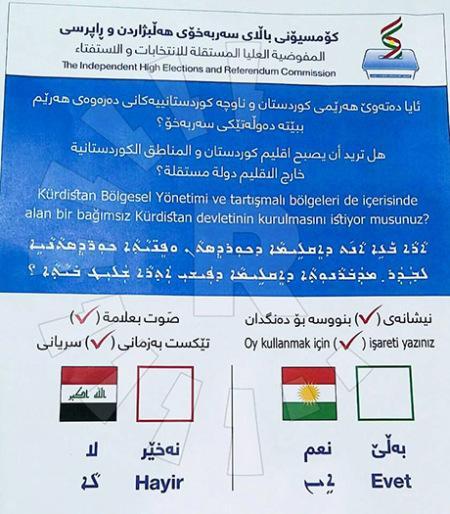
Ballot in referendum on independence for Iraqi Kurdistan | image via Wikipedia
Some 5.3 million registered Kurdish voters headed to the polls on Monday 25th Sep. 2017 to decide in a referendum vote whether they want to become an independent nation-state. Three northern Iraqi provinces — Erbil, Duhok and Sulaymaniyah – comprise the parliamentary democracy governed by the Kurdistan Regional Government in Iraq. The referendum took place within the borders of the Iraqi Kurdistan region, as well as in disputed territories that have been under de facto Kurdish control since their liberation from ISIS (e.g., Kirkuk). Kurds voted to decide whether autonomous Kurdistan should disengage from Iraq and become independent or remain within the Iraqi state.
The referendum was the Iraqi Kurds’ first concrete step towards realizing their over-a-century-old dream of an independent Kurdish state. The vote will likely give the Kurds more bargaining power vis-à-vis Baghdad and the international community once the fight against ISIS has been concluded.
As expected the ballot delivered an overwhelming endorsement of independence, under the leadership of Kurdish president Massoud Barzani. With a turnout around 72 %, more than 92% of voters in Iraqi Kurdistan have opted for independence, according to election monitors, in an overwhelming endorsement of a proposed split from Baghdad.
Unfortunately is only in Iraq where the Kurds were strong enough to have their autonomy inscribed into the country’s constitution, primarily due to the intervention of Western nations following the 1991 U.S. war with Iraq that followed the invasion of Kuwait by Iraqi leader Saddam Hussein. In Iraq, Kurds control their land borders with neighboring countries. They maintain their own security force (the Peshmerga, who successfully helped battle the Islamic State terrorist group), they draft their own laws and elect their own parliament. In effect, the Kurds already maintain nearly everything necessary for an independent state.
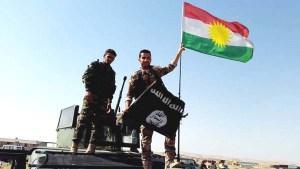
Peshmerga soldiers replace Daesh flag with Kurdistan flag.
Baghdad, Tehran, Damascus, and Ankara are all opposed to an independent Kurdish state for the same reason as China: it could encourage separatism among their own minorities.
On the other hand, Turkey, Iraq and Iran all reject the establishment of an independent Kurdish state, as does the United States, which is concerned that such a step at this point in time could lead to war in the region. Israel is the only state that has expressed support for Kurdish aspirations. Before ballot President Barzani ignored calls from his neighbors as well as from the US, the UK, the EU, the UN and the Arab League to cancel the vote and delve into more talks about the status of Iraq’s Kurds with Baghdad.
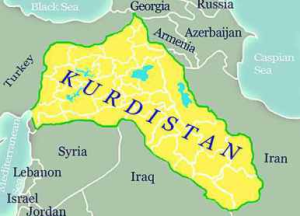
It appears that only two nations were celebrating Monday’s Kurdish referendum on independence: Kurds and Israelis.
According JewishPress Israeli social media has been bubbling over the referendum, which is being tallied as this report is being published – and the dominant sentiment being expressed there is: should the free Kurdistan come under attack from its neighbors, Israel would be obligated to come to its aid.
Kurdistan’s and Israel’s enemies are the same. Should a war for free Kurdistan erupt, it will likely focus on Kirkuk, which at the moment is threatened by Shia militias loyal to Iran and to the Iraqi government south of the city. Turkish president Erdogan is threatening to cut the pipeline that exports Iraqi Kurds’ oil to Europe via Turkey. And the Iraqi Prime Minister, Haider al-Abadi, has threatened to take military action should the referendum decide on a free Kurdistan. (Source: JewishPress ).
After ballot Turkey’s pro-Kurdish Peoples’ Democratic Party (HDP) said the official results of Kurdistan Region’s referendum on independence from Iraq announced on Wednesday were legitimate. Turkey’s second largest opposition bloc said that Erbil’s authorities conducted the referendum in a transparent and participatory manner. The HDP reiterated its call for the creation, without delay, of a national congress that would encompass and be representative of people from the four parts of the historical Kurdish homeland divided between Iraq, Syria, Turkey, and Iran. “It is a necessity for making contributions to regional peace and for taking steps towards the establishment of the political, cultural, economic and social unity of the Kurdish people,” the HDP added about the proposed congress. (Source: Kurdistan24.net )
Israel’s approach
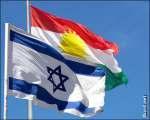
- Former Minister Gideon Saar from Likud: “I hope that if a majority votes for independence, Israel will be the first state to recognize the independence of Kurdistan.”
- Communications Minister Ayoob Kara: “The Kurdish referendum will expedite a comprehensive arrangement in the Middle East, and correct the historic Sykes-Picot Agreement, which failed to consider the needs of many minorities, including 40 million Kurds.”
- Yesh Atid Chairman Yair Lapid: “The Jewish people know what it is to struggle for a homeland, the Kurds have a moral right to a state of their own.” Later in the day, Lapid linked to what he called an “excellent article” in The New York Times, written by Ron Prosor, former Israeli ambassador to the United Nations.
- Ron Prosor explains the strategic importance of creating an independent Kurdistan and claims that it would be a wise move for the United States to support Kurdish independence because the Kurdish state would contribute to the war against the Islamic State (IS), especially since the Kurds are already important allies in this struggle. Prosor believes that US support for the referendum and an independent Kurdistan would be a victory for democratic values, self-determination and minority rights.
- Prime Minister Benjamin Netanyahu expressed his support for an independent Kurdish state in 2014. In a Sept. 12 statement released by Netanyahu, he declared that Israel “support[s] the legitimate efforts of the Kurdish people to achieve their own state.”
- Justice Minister Ayelet Shaked of HaBayit HaYehudi supported Kurdish independence in a recent speech: “It is in the interest of Israel and the United States that a Kurdish state be established.” In a speech to the Herzliya Conference in 2015, Shaked had referenced the Kurds’ commitment to democracy, the long ties between the Jewish people and the Kurds and their common interests, which she said were more apparent than ever. They were both fighting against radical forces, particularly IS, which the Kurds of Iraq and Syria have been relentlessly fighting. In that speech, Shaked argued that the situation represented a rare chance to reshape the character and future of the Middle East.
The Israeli media expressed its encouragement and support for the Kurds through its extensive coverage of the referendum. Such encouragement is, in fact, the legacy of a large sector of the Israeli public, as illustrated by interviews with security officials who had been sent by various Israeli governments to northern Iraq in the 1960s to provide the Kurds with support and training. This period of cooperation, which lasted a decade, was particularly fruitful and close, according to Brig. Gen. (Res.) Tzuri Sagi in an interview with Army Radio. Sagi, 83, said that he was sent to train the Kurdish army in 1966 and spent many long years in Kurdistan, together with representatives of Mossad, Israel Defense Forces Medical Corps and Israeli combat officers. Of note, they entered the region through Iran, which then had warm diplomatic relations with Israel. Sagi spoke fondly about the Kurdish people and said that he eagerly awaited the Kurdish declaration of independence “despite the wrath and fury of the entire world.”
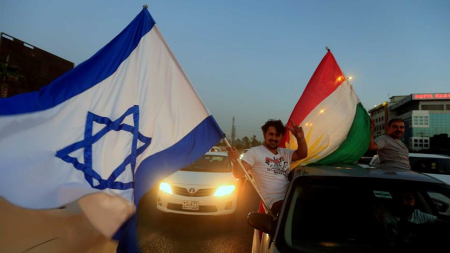
Kurdish men hold Israeli and Kurdish flags during a rally to show support for the upcoming independence referendum, Erbil, Iraq, Sept. 22, 2107.
Oil & gas aspect
According Reuters – Turkey threatened potentially crippling restrictions on oil trading with Iraqi Kurds on Thursday after they backed independence from Baghdad in a referendum that has alarmed Ankara as it faces a separatist insurgency from its own Kurdish minority. Iraqi Prime Minister Haider al-Abadi’s office said he had been told by Turkish Prime Minister Binali Yildirim in a call that Turkey would break with past practice and deal only with the Baghdad government over oil exports from Iraq.

KRG natural resources minister Ashti Hawrami (left) and Rosneft CEO Igor Sechin sign their original Investment Agreement 2 Jun 2017 in St Petersburg (Photo credit: Rosneft)
Russia’s interest in the region is growing. Oil major Rosneft (ROSN.MM) is increasing investment in Kurdistan and the Kurds have been developing strong ties with Moscow. The Russian leadership received officials from both Baghdad and Erbil earlier this year. Putin met Iraqi Kurdish Prime Minister Nechirvan Barzani in June and Iraqi Vice President Nuri al-Maliki visited Russia a month later. “Russia is one of the biggest investors in the economy of Iraqi Kurdistan at this moment,” Kirill Vertyayev, a senior research fellow at the Institute of Oriental Studies in Moscow, said. (Source: Reuters)
Russia finds itself in the position of having become the major investor in Iraqi Kurdistan. Russian spending in the area’s oil and gas industry has reached at least $4 billion. In February, Russia’s state-owned oil giant Rosneft announced it would finance in advance a two-year deal, beginning this year, to buy Kurdish crude for the company’s growing global refining system. In early June, Rosneft signed a 20-year deal to buy Kurdistan oil and refine it in Germany. The parties also inked a contract to explore and develop five oil fields “with substantial geological potential” in Iraqi Kurdistan. (Source: Al-Monitor )
On 18th Sept. 2017, Rosneft made public a project to finance construction of Iraqi Kurdistan’s gas pipeline infrastructure, with expected export capacity by 2020 of 30 billion cubic meters (more than a trillion cubic feet) a year. Rosneft said it has negotiated “an opportunity” to participate in a gas infrastructure project with the Kurdistan Regional Government (KRG) of Iraq and that it expects to finalise a separate agreement under this project by year-end. The gas pipeline will not only supply natural gas to the power plants and domestic factories throughout the region but also enable exports to Turkey and Europe in the coming years, said Rosneft. Source: Natural Gas World
China, a permanent member of the UN Security Council (UNSC) with ambitions to become a major player in the Middle East, will need to take a clear position on the “Kurdish question.” Beijing fears that Kurdish independence could fuel separatist movements within China, the emergence of a Kurdish state could turn out to be a net positive for the Asian giant. China maintains cordial diplomatic and commercial relations with the Kurds, but opposes a unilateral Kurdish declaration of independence. Chinese foreign policy at the global level is to promote peace and the reasonable settlement of disputes through dialogue and negotiation, with an emphasis placed on the role of the UN Security Council.
Dr. Mordechai Chaziza – BESA Center – argues that an independent and friendly Kurdish state could provide Beijing with a new ally in the Middle East and a new instrument of influence in the region. Despite Beijing’s official opposition to separatist movements, Chinese companies have strong energy and economic stakes in Kurdistan, making it different from other such movements. Beijing has also found the Kurds to be a reliable regional ally as well as a lethal and valuable asset against ISIS and al-Qaeda. The Kurdish issue provides China with leverage against Turkey, which continues to host Uyghur separatists and organizations. Finally the most important aspect: China is interested in Iraqi Kurdistan’s rich oilfields, which could diversify its oil supplies.
Peshmerga fighters took control of the Kirkuk oilfields in 2014, when the Iraqi army fled in the wake of Islamic State’s advance on the city. Kirkuk is home to Kurds, Turkmens and Arabs. The latter appeared to boycott the ballot, while Kurds turned out in large numbers. The Kurdish north has completed construction of a pipeline to Turkey, which has helped the Kurds export oil using its Mediterranean port.Trade between Erbil and Ankara is thought to be close to £7.5bn a year, meaning Turkey would face a significant financial blow if it chose to close its borders.
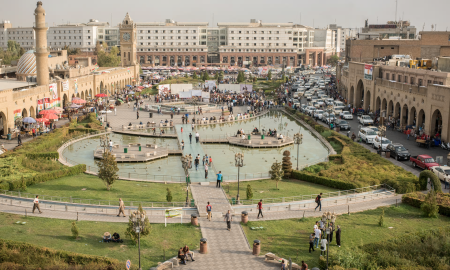
Central Erbil, Iraq. Photograph: Cengiz Yar Jr
" data-orig-size="1920,1152" sizes="(max-width: 450px) 100vw, 450px" data-image-title="Nimetön (122)" data-orig-file="https://arirusila.files.wordpress.com/2017/09/nimetc3b6n-122.png" data-image-meta="{"aperture":"0","credit":"","camera":"","caption":"","created_timestamp":"0","copyright":"","focal_length":"0","iso":"0","shutter_speed":"0","title":"","orientation":"0"}" width="450" data-medium-file="https://arirusila.files.wordpress.com/2017/09/nimetc3b6n-122.png?w=300" data-permalink="https://arirusila.wordpress.com/2017/09/29/kurdish-referendum-delivered-an-overwhelming-endorsement-of-independence/nimeton-122/" alt="" height="270" srcset="https://arirusila.files.wordpress.com/2017/09/nimetc3b6n-122.png?w=450&h;=270 450w, https://arirusila.files.wordpress.com/2017/09/nimetc3b6n-122.png?w=900&h;=540 900w, https://arirusila.files.wordpress.com/2017/09/nimetc3b6n-122.png?w=150&h;=90 150w, https://arirusila.files.wordpress.com/2017/09/nimetc3b6n-122.png?w=300&h;=180 300w, https://arirusila.files.wordpress.com/2017/09/nimetc3b6n-122.png?w=768&h;=461 768w" class="wp-image-5667 size-large" data-large-file="https://arirusila.files.wordpress.com/2017/09/nimetc3b6n-122.png?w=450&h;=270" />Central Erbil, Iraq. Photograph: Cengiz Yar Jr
Kurdistan24.net reports that Sunni Arab tribes in the disputed areas outside of the Kurdistan Regional Government’s (KRG) administration support the right of self-determination. On Thursday [28th Sep.2017], Sunni tribal leaders held a summit in Erbil under the banner ‘The Sunni Conference in Solidarity with Kurdistan’ to express their support for the independence referendum held in the Region on Monday. In a statement following the conference, Sunni tribal leaders declared that the right to self-determination is a ‘legitimate right’ of all peoples in line with every international principle and convention. “The Sunni Arabs declare their solidarity with the people of Kurdistan and respect their will and choice,” the statement read.
Kurdish officials say they can withstand an economic blockade because they are self-sufficient in terms of power generation and fuel supply, and they also have fertile agricultural land.
My view
It seems so that everybody – except Israel – fears Kurdish independence much the way everybody once feared Jewish independence – and maybe for a same reason as the new Kurdistan is a democratic island surrounded by tyrannies; it is a prosperous nation; and it is willing and able to fight for its independence.
I agree with those who claim that Kurdish secession could destabilize the rump Iraqi state politically, economically, and militarily. So what? Artificial state-facade in my opinion is secondary value compared to fair will of people from grassroots. From my point of view it is also Israels’ strategic interest to support Kurdish case by all means – military aid included.
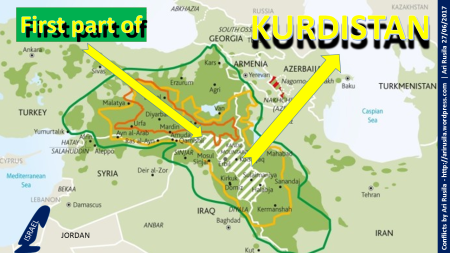
Related article: Kurdistan Taking Shape – with Israeli Support
Advertisements
